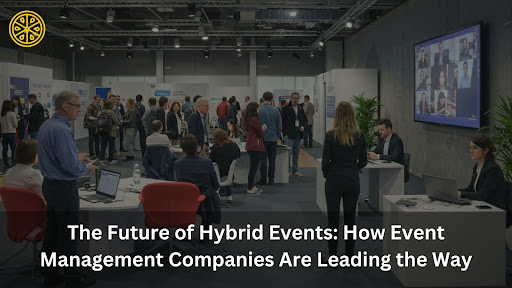The Future of Hybrid Events: How Event Management Companies Are Leading the Way

The events industry has seen a dramatic transformation over the past few years, and one of the most significant changes is the rise of hybrid events. These events combine the best of both in-person and virtual experiences, creating opportunities for wider reach, deeper engagement, and more flexible participation. In 2025, hybrid events are expected to be a major force in the event industry, and event management companies like https://eventmanagementcompany.uk/ are leading the way in making them a reality.
But why are hybrid events so important? What makes them so appealing to businesses and event organizers? The answer lies in their ability to cater to the evolving needs of both in-person and remote audiences. As an attendee, whether you’re physically present or tuning in from home, a well-executed hybrid event provides a seamless, engaging experience that keeps everyone connected and involved.
In this article, I will walk you through the rise of hybrid events, the role event management companies play in making them successful, and what you can expect for the future of hybrid events. Let’s dive into the exciting potential these events hold.
At the heart of the hybrid event model is the blending of two event formats: in-person and virtual. In the past, event organizers had to choose between the two, but hybrid events allow for both physical and digital participation. This hybrid format offers flexibility, enabling a global audience to attend without the need for travel.
For example, consider a corporate conference that invites keynote speakers to present in-person, but also offers attendees the chance to tune in remotely. This approach maximizes reach, extends audience engagement, and makes the event accessible to a larger group of people—no matter where they are.
Why Are Hybrid Events So Popular?
Hybrid events are becoming the new standard in the event industry because they offer several clear advantages over traditional, in-person-only events. Let’s take a closer look at the key benefits:
- Greater Accessibility With hybrid events, people from all over the world can attend and participate. Virtual access eliminates geographical limitations, which is particularly important for global organizations or businesses with remote teams.
- Increased Engagement While in-person events are still valuable for face-to-face interaction, hybrid events offer a platform for interactive features like live polling, Q&A sessions, and networking opportunities that engage both in-person and online attendees.
- Cost Efficiency By providing virtual access to an event, companies can reduce the costs associated with venue rentals, travel, and accommodations. These savings can be allocated to other aspects of the event, such as high-quality production or marketing.
- Flexibility and Convenience Hybrid events offer flexibility for both organizers and attendees. For those who can’t attend in person due to time constraints or health concerns, the virtual option provides a convenient alternative without sacrificing participation.
- Data and Analytics With digital platforms, event organizers can gather data on attendees’ interactions, engagement levels, and interests. This valuable information can be used to improve future events and better understand the audience’s needs.
The Role of Event Management Companies in Hybrid Events
Event management companies are crucial in the successful execution of hybrid events. They provide expertise in handling logistics, technology, and on-site operations, ensuring that everything runs smoothly. Here’s how they contribute to making hybrid events successful:
1. Technology Integration
One of the biggest challenges in hybrid events is seamlessly integrating technology to ensure that both virtual and in-person attendees have a smooth experience. Event management companies have access to the latest event technology and platforms to ensure high-quality video streaming, interactive tools, and user-friendly interfaces.
2. Logistics Coordination
Managing a hybrid event requires meticulous coordination between the physical and virtual components. Event management companies are adept at handling all the logistics, from selecting the right venue and vendors to ensuring that the virtual components are up to par.
3. Audience Engagement Strategies
Keeping both in-person and virtual attendees engaged can be challenging. Event management professionals create strategies for engagement, such as live-streamed breakout sessions, virtual networking rooms, and interactive features that allow both groups to feel involved.
4. Marketing and Promotion
Promoting a hybrid event to both in-person and online audiences requires a tailored marketing approach. Event management companies assist with crafting compelling messaging, creating content for social media platforms, and running digital campaigns that target both physical and remote participants.
5. Event Production and Support
Hybrid events require smooth and professional production to keep everything on track. Event management companies provide technical support during the event, ensuring that all equipment, speakers, and online platforms are functioning correctly, minimizing disruptions.
Trends Shaping Hybrid Events in 2025
The hybrid event model is evolving, and several key trends will shape how they are organized and experienced in the coming years. Here are some of the most important developments to keep an eye on:
1. Personalized Experiences
In 2025, hybrid events will become even more personalized. Event organizers will leverage data and artificial intelligence (AI) to customize experiences for attendees, offering personalized agendas, tailored content, and custom recommendations based on their preferences and past behavior.
2. Greater Integration of Virtual Reality (VR) and Augmented Reality (AR)
Virtual reality and augmented reality will play an increasingly important role in hybrid events, offering immersive experiences that blend the physical and digital worlds. For instance, VR could be used to create virtual tours of a conference venue, while AR could be used to enhance product demonstrations and presentations.
3. Improved Networking Opportunities
Networking will continue to be a major focus of hybrid events. Event management companies will implement new technologies that facilitate better networking between virtual and in-person attendees, such as AI-powered matchmaking systems, virtual meeting rooms, and interactive chat features.
4. Sustainability and Green Practices
Hybrid events are inherently more sustainable than traditional in-person events, as they reduce the need for travel and large-scale in-person gatherings. In 2025, expect to see even more emphasis on sustainable practices, with event organizers opting for eco-friendly technology, venues, and event materials.
5. Advanced Analytics for Better Insights
Data collection and analysis will continue to play a critical role in hybrid events. With real-time analytics, organizers can track attendee behavior, session engagement, and feedback to refine their strategies and deliver more meaningful experiences for future events.
How to Choose the Right Event Management Company for Hybrid Events
Selecting the right event management company for your hybrid event is essential to its success. Here are some key factors to consider when making your choice:
1. Expertise in Hybrid Events
Make sure the event management company you choose has experience planning and executing hybrid events. They should be able to guide you through the technical, logistical, and creative aspects of the event.
2. Technology Infrastructure
The company should have access to the latest event technology and be able to integrate various virtual and physical elements seamlessly. Ask about their experience with live streaming, virtual platforms, and interactive features.
3. Flexibility and Customization
Your event is unique, so it’s important that the event management company can tailor their approach to meet your specific needs. Look for a company that is flexible and willing to work with you to create a customized experience for both in-person and virtual attendees.
4. Budget Considerations
Hybrid events can be more expensive than traditional in-person events due to the additional technology and logistical considerations. Make sure the event management company can work within your budget while still delivering a high-quality experience.
5. Reputation and Reviews
Check the company’s reputation and reviews from previous clients. Their track record will give you insight into their ability to successfully manage hybrid events and deliver on their promises.
Conclusion
Hybrid events are the future of the event industry, and event management companies are leading the charge in making these events a reality. With their expertise, technology, and creative solutions, they are transforming how businesses approach events in 2025.
Whether you’re hosting a small corporate meeting or a large conference, embracing the hybrid model allows you to reach a wider audience and create a more engaging, interactive experience. By partnering with a trusted event management company you can ensure your hybrid event is executed flawlessly and leaves a lasting impression on your attendees.

Source: The Future of Hybrid Events: How Event Management Companies Are Leading the Way



